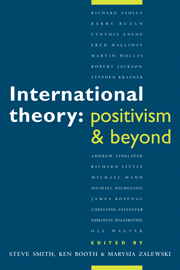Book contents
- Frontmatter
- Contents
- List of contributors
- Preface and acknowledgements
- Introduction
- I Debates
- II Legacies
- 2 The timeless wisdom of realism?
- 3 The growing relevance of pluralism?
- 4 The inter-state structure of the modern world-system
- 5 The accomplishments of international political economy
- 6 The continued significance of positivism?
- III Silences
- IV Openings
- V Directions
- Index
3 - The growing relevance of pluralism?
Published online by Cambridge University Press: 09 March 2010
- Frontmatter
- Contents
- List of contributors
- Preface and acknowledgements
- Introduction
- I Debates
- II Legacies
- 2 The timeless wisdom of realism?
- 3 The growing relevance of pluralism?
- 4 The inter-state structure of the modern world-system
- 5 The accomplishments of international political economy
- 6 The continued significance of positivism?
- III Silences
- IV Openings
- V Directions
- Index
Summary
During the late 1960s and throughout the 1970s it began to be argued in the field of International Relations that the nature of international politics and the structure of the international system was undergoing a transformation. It was argued, in particular, that the division between international and domestic politics was breaking down and that, as a consequence, not only were the boundaries separating states dissolving, but also, that international politics was becoming domesticated in the process (Hanreider, 1978; Morse, 1970; Wagner, 1974). These developments were associated specifically with the evolution of transnationalism and interdependence and the analysts who focused on these putatively new features of the international system came to be labelled as pluralists. Initially, pluralists asserted that because state boundaries were becoming increasingly permeable it was no longer possible to understand international relations simply by studying the interactions among governments. Pluralists wished to focus on all the transactions which take place across state boundaries and many were committed to the view that these transactions would envelop states generating what Haas (1969) called a ‘tangle of hope’ within which it would be increasingly difficult for states to engage in war.
As well as providing the foundations for a new approach to the study of international politics this emerging school of thought was seen simultaneously to be mounting a significant attack on realism, widely considered to provide the dominant perspective on international relations.
- Type
- Chapter
- Information
- International TheoryPositivism and Beyond, pp. 66 - 86Publisher: Cambridge University PressPrint publication year: 1996
- 9
- Cited by



